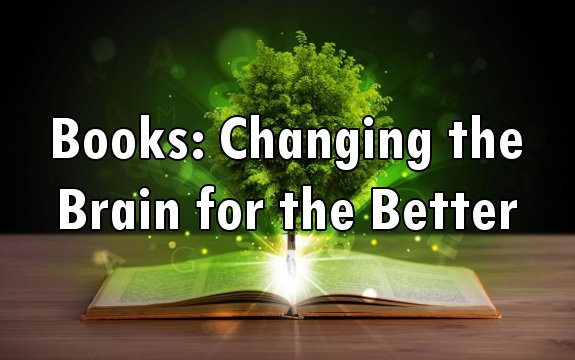Study: Reading Books Triggers Lasting Changes in the Brain

 If you’re a reader, chances are there are a few books that stand out as having changed the way you thought about something. Far more than just a little escapism, books have the ability to change our lives, and as a new study shows—they can even change our brain chemistry.
If you’re a reader, chances are there are a few books that stand out as having changed the way you thought about something. Far more than just a little escapism, books have the ability to change our lives, and as a new study shows—they can even change our brain chemistry.
Researchers from Emory University in Atlanta published their work in the journal Brain Connectivity, where they revealed reading a novel can have lasting effects on the brain.
For the study, 21 undergraduates were recruited to read the novel Pompeii, by Robery Harris. Written in 2003, the volume follows a protagonist as he watches the impending eruption of Mount Vesuvius from afar. It’s a thriller and has a “strong narrative line”, something the researchers thought important when choosing the book.
“We sought to determine whether reading a novel causes measurable changes in resting-state connectivity of the brain and how long these changes persist. On the days after the reading, significant increases in connectivity were centered on hubs in the left angular/supramarginal gyri and right posterior temporal gyri.
… These hubs corresponded to regions previously associated with perspective taking and story comprehension, and the changes exhibited a timecourse that decayed rapidly after the completion of the novel. Long-term changes in connectivity, which persisted for several days after the reading, were observed in bilateral somatosensory cortex, suggesting a potential mechanism for “embodied semantics,” says the study abstract.
Paradigm Shift: British Docs Prescribing Books for Depression
For 9 days, the students went home with a nightly reading assignment. Each morning, they would come back and take a quiz to ensure they did the reading, followed by an MRI to analyze the activity in their brain. When compared with a pre-reading MRI, the researchers noted considerable differences in the left temporal cortex, an area of the brain linked to language receptivity.
Like “muscle memory”, this heightened connectivity remained in the student’s brains when they were no longer reading.
The researchers also noticed heightened connectivity in the central culcus, a “main sensory motor region of the brain”. This area of the brain, they explain, activates neurons that are associated with the actual motion of running when we merely think of running, for example.
What does this mean? Lead researcher and neuroscientist Gregory Berns says it indicates a good book can actually put you in the protagonist’s body.
“We already knew that good stories can put you in someone else’s shoes in a figurative sense. Now we’re seeing that something may also be happening biologically.”
These brain changes didn’t fade during the day after reading and actually remained even 5 days after the novel was finished. Though unsure of how long the changes could last, Berns says it suggests reading your favorite novels could have a significant impact on the biology of your brain.
For more on the benefits of books and reading, check out these 5 studies showing how reading is healthy.

Great post! One thing when people are depressed they may have concentration problems and have a hard time reading. Otherwise I agree one thousand percent! Thank You!
…positive change greatly depends on what you are reading, example: Communist Manifesto, and Mein Kampf, would not be a positive change in the brain.
Great point!